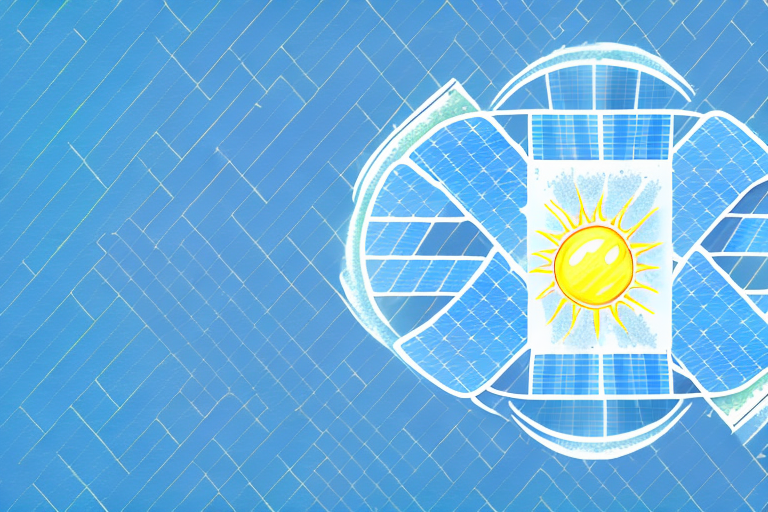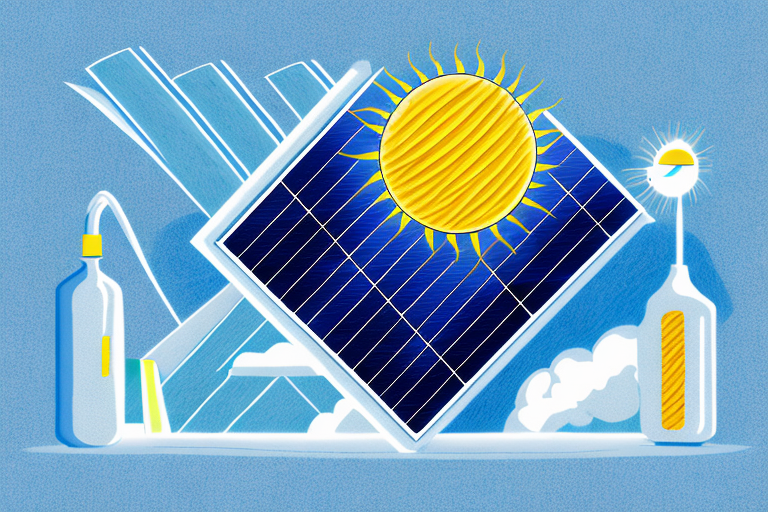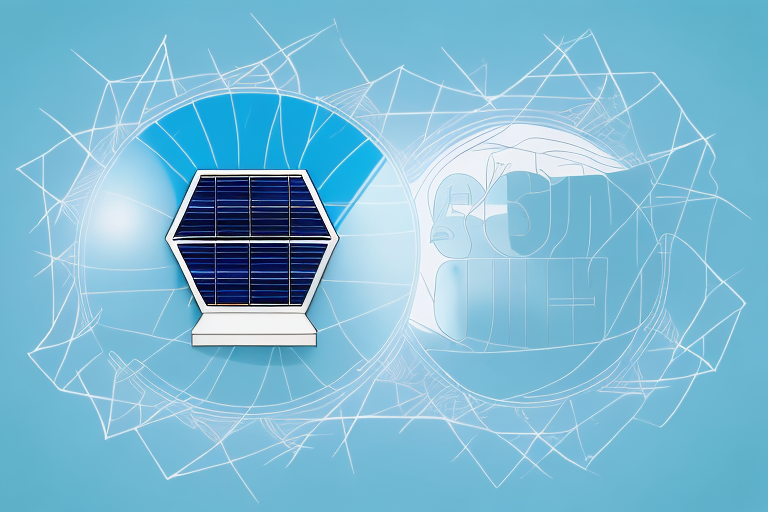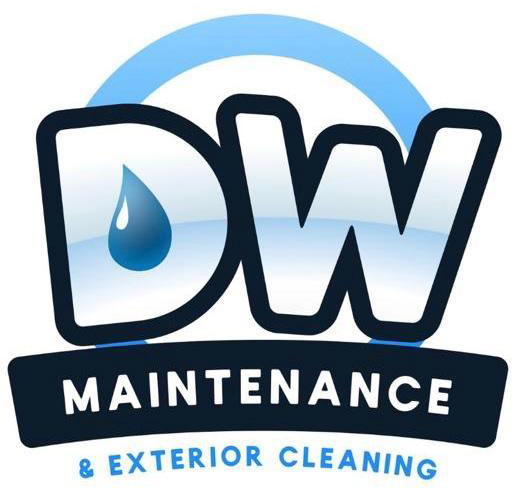Solar panels are an investment towards green energy that can save substantially on electricity bills. However, to ensure maximum efficiency, it is essential to keep solar panels clean. You might be wondering, is it necessary to clean solar panels? The answer is yes, and DW Maintenance & Exterior Cleaning will go through the reasons why in this article. And, if you’re considering using reputable roof cleaning in London that includes solar panel cleaning, then look no further.
Understanding Solar Panel Efficiency
Solar panel efficiency refers to the amount of energy the panels produce relative to the amount of sunlight they receive. The more light a panel receives, the more electricity it produces. Efficiency, in turn, affects the overall performance of the solar power system.
When considering solar panel efficiency, it is important to understand how solar panels work. Solar panels use photovoltaic cells to convert sunlight into energy. When sunlight hits the cells, it frees electrons, creating a flow of electricity. To turn this energy into usable power, an inverter is used to change the direct current (DC) into alternating current (AC).
Factors Affecting Solar Panel Efficiency
Several factors can impact solar panel efficiency, including the angle of the panels in relation to the sun, shading, panel orientation, and weather conditions. The angle of the panels is particularly important, as it affects the amount of sunlight that hits the cells. Panels that are not angled correctly may not receive enough sunlight, resulting in reduced energy output.
Shading is another factor that can significantly impact solar panel efficiency. Even a small amount of shading, such as from a nearby tree or building, can reduce the amount of sunlight that hits the cells, lowering energy output. Panel orientation is also important, as panels that face south generally receive more sunlight than those facing north.
Weather conditions can also impact solar panel efficiency. Cloudy or overcast days can reduce the amount of sunlight that hits the cells, resulting in lower energy output. However, it is important to note that solar panels can still produce energy on cloudy days, albeit at a reduced rate.
The Impact of Dirt and Debris on Efficiency
Dirt, debris, and other contaminants are common culprits that significantly reduce solar panel efficiency. Even a small amount of debris, such as leaves or dust film, can block sunlight from reaching the cells, reducing energy output. It is important to regularly clean solar panels to ensure maximum efficiency. In some cases, professional cleaning services may be required to remove stubborn debris.
In conclusion, understanding the factors that impact solar panel efficiency is crucial for maximising energy output and getting the most out of your solar power system. By ensuring that your panels are angled correctly, free from shading, and regularly cleaned, you can help to maintain optimal efficiency and reduce your reliance on traditional power sources.
The Importance of Solar Panel Cleaning

Cleaning solar panels is an essential aspect of maintaining their efficiency and ensuring the best return on investment. Solar panels are a significant investment, and regular cleaning can help extend their lifespan and maximise their energy production.
Dirty solar panels can significantly affect their performance and cause a decrease in energy production. When solar panels are covered in dirt and debris, they cannot absorb sunlight as effectively, resulting in less energy generation. This decrease in energy production can lead to a reduction in savings and a longer payback period for your solar investment.
Types of Dirt and Debris
Several types of dirt and debris can accumulate on solar panels, including leaves, dust, pollen, bird droppings, and tree sap. Bird droppings, in particular, can cause significant damage to solar panels due to their high acidity levels. Tree sap can also cause damage to solar panels, as it can harden and create a film over the panels, reducing their efficiency.
It is essential to clean solar panels regularly to prevent the buildup of dirt and debris that can cause damage and reduce their efficiency.
The Effects of Weather and Location
The weather and location of your solar panels can also impact how often you need to clean them. If you live in an area with high levels of dust or pollution, you may need to clean your solar panels more frequently. Similarly, if you live in an area with lots of rainfall, you might need to clean your solar panels less often.
It is important to note that solar panels located in areas with high humidity levels may be more prone to dirt and debris buildup due to the moisture in the air. Therefore, it is essential to consider the weather and location of your solar panels when determining your cleaning schedule.
The Role of Solar Panel Coatings
Applying coatings to solar panels can help mitigate some of the issues related to dirt and debris. Coatings such as hydrophobic coatings can help repel rain and prevent debris from sticking to the panels, reducing the need for frequent cleaning.
Additionally, anti-reflective coatings can help increase the amount of sunlight absorbed by solar panels, further improving their efficiency. These coatings can also help protect solar panels from scratches and other damage, extending their lifespan.
In conclusion, cleaning solar panels is crucial to maintain their efficiency, increase energy production, and reduce the chance of damage or degradation. By understanding the types of dirt and debris that accumulate on solar panels, the effects of weather and location, and the role of solar panel coatings, you can ensure that your solar investment is operating at its maximum potential.
How Often Should You Clean Your Solar Panels?

Solar panels are an investment that can save you money on your energy bill and reduce your carbon footprint. However, to ensure that they continue to function at their best, it’s important to keep them clean. There are different recommendations for how often to clean solar panels, depending on factors such as location, weather, and environment.
One factor to consider is the amount of rainfall in your area. If you live in an area with frequent rain, your solar panels may not need to be cleaned as often. However, if you live in an area with little rain, you may need to clean your panels more frequently to remove dust and dirt buildup.
Professional Recommendations
When it comes to cleaning solar panels, it’s always best to consult a professional. They can assess your panels and determine the best cleaning schedule for your specific situation. Some experts recommend cleaning solar panels every six months, while others suggest cleaning them annually.
Professional cleaning services will use specialised equipment and cleaning solutions to ensure that your panels are cleaned safely and effectively. They can also identify any potential issues with your panels and address them before they become bigger problems.
Signs Your Solar Panels Need Cleaning
If you’re not sure when to clean your panels, there are a few signs to look out for. Reduced energy output is one indicator that your panels may need cleaning. If you notice that your energy bill is higher than usual, it may be due to dirty solar panels.
Visual cues can also indicate that your panels need cleaning. Dirt buildup, bird droppings, and other debris can accumulate on your panels and reduce their efficiency. Regular inspections can help you identify these issues before they become bigger problems.
Seasonal Considerations
Seasonal changes can impact the amount of cleaning solar panels require. For example, in the fall, leaves and debris can accumulate more quickly than other seasons. Therefore, it’s essential to consider seasonal changes when determining a cleaning schedule.
It’s also important to note that extreme weather conditions can affect the efficiency of your solar panels. For example, heavy snowfall can cover your panels and prevent them from generating energy. In these cases, it’s important to remove the snow as quickly as possible to ensure that your panels continue to function properly.
Overall, regular cleaning and maintenance can help extend the lifespan of your solar panels and ensure that they continue to function at their best. By consulting a professional and staying aware of seasonal changes and weather conditions, you can keep your solar panels clean and efficient for years to come.
Cleaning Methods and Best Practices

Solar panels are an excellent investment for homeowners and businesses alike, providing clean and renewable energy while reducing electricity bills. However, to ensure optimal performance, regular cleaning is necessary. In this article, we will discuss various cleaning methods and best practices for solar panels.
DIY Cleaning Techniques
DIY cleaning techniques are a cost-effective way to clean solar panels. One of the most common methods is to use soft brushes, squeegees, and soapy water. However, it’s essential to take safety precautions, as solar panels require access to rooftops or high places. Before climbing onto the roof, ensure that the ladder is stable and secure. Additionally, it’s crucial to wear non-slip shoes and have a safety harness in place.
When cleaning the panels, avoid using harsh chemicals or abrasive materials, as they can scratch and damage the panels. Instead, use a mild detergent and a soft-bristled brush to remove any debris or dirt. Rinse the panels thoroughly with a hose and dry them with a soft cloth.
Hiring Professional Solar Panel Cleaners
If you’re not comfortable cleaning the solar panels yourself, hiring a professional solar panel cleaning service is an excellent option. Professional cleaners are trained in both safety and effective cleaning techniques and can safely perform cleaning services on your behalf. They use specialised tools and equipment to maximise the efficiency and longevity of your solar panels.
Professional cleaners also have the expertise to identify any potential issues with your solar panels, such as cracks or damage, and can advise you on the best course of action.
Safety Precautions and Tips
Safety is a crucial consideration when cleaning solar panels. Always ensure the panels are turned off before cleaning and use proper protective gear, such as gloves and safety glasses. Avoid using metal tools, harsh chemicals, and high-pressure washers, which can damage panels. Additionally, take extra care when accessing rooftops or high places. If you’re not comfortable or confident in your ability to clean the solar panels safely, it’s best to hire a professional cleaning service.
In conclusion, regular cleaning of solar panels is essential for optimal performance and longevity. Whether you choose to clean the panels yourself or hire a professional service, following these best practices and safety tips will help ensure that your solar panels continue to provide clean and renewable energy for years to come.
Final Thoughts
Is it necessary to clean solar panels? Absolutely. Cleaning solar panels plays a vital role in maintaining their efficiency, performance, and overall longevity. By following the recommended cleaning schedules and techniques, investing in professional services when necessary, and taking appropriate safety measures, you can maximise the benefits of your solar energy system.
While solar panels are a great way to produce clean energy and reduce your carbon footprint, they do require some maintenance to keep them functioning at their best. Over time, dirt, dust, and other debris can accumulate on the surface of your solar panels, reducing their ability to absorb sunlight and convert it into electricity.
Regular cleaning is essential to ensure that your solar panels are operating at peak efficiency. Depending on your location and the weather conditions in your area, you may need to clean your solar panels more frequently. For example, if you live in an area with high levels of air pollution or dust, you may need to clean your panels more often than someone who lives in a cleaner environment.
When it comes to cleaning your solar panels, there are a few things to keep in mind. First, it’s important to use the right tools and techniques to avoid damaging the panels. Avoid using abrasive materials or harsh chemicals that can scratch or corrode the surface of the panels. Instead, use a soft-bristled brush or a squeegee to gently remove dirt and debris.
It’s also important to take appropriate safety measures when cleaning your solar panels. Make sure that you have a stable ladder or scaffolding to access the panels, and wear appropriate safety gear, such as gloves and safety glasses. If you’re not comfortable cleaning your solar panels yourself, consider hiring a professional service to do the job for you.
Investing in regular cleaning and maintenance for your solar panels can help to extend their lifespan and maximise their efficiency. By keeping your panels clean and well-maintained, you can enjoy the benefits of clean, renewable energy for years to come. Tips to maintain your solar panels.

